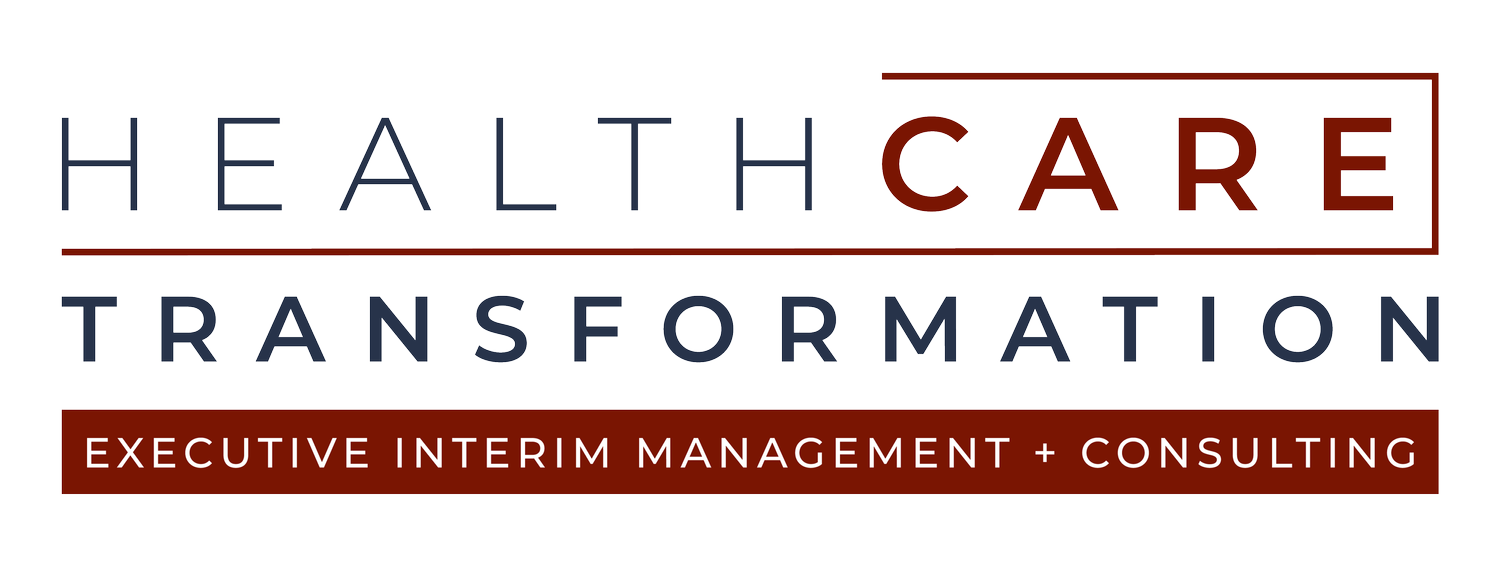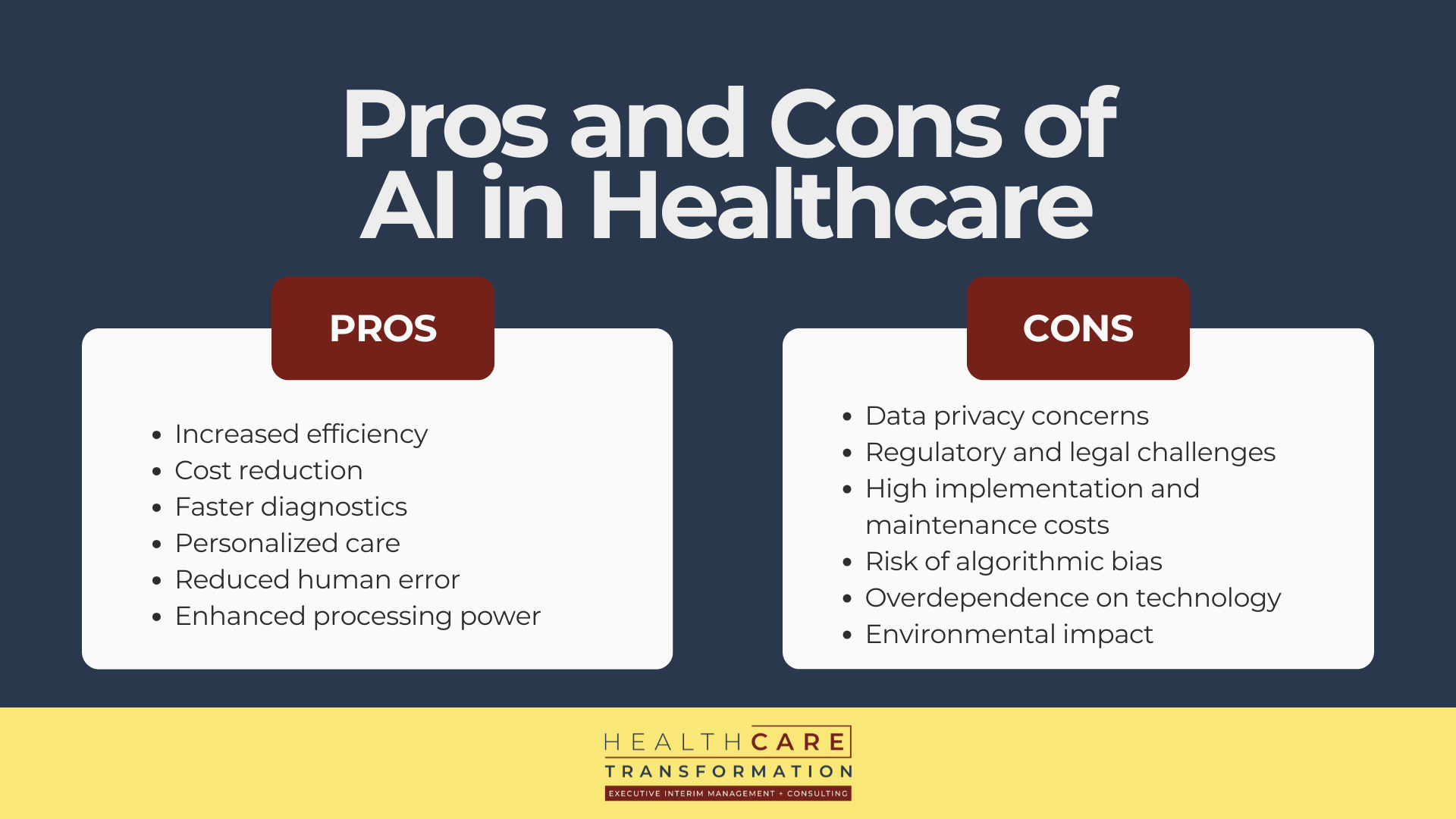AI in Healthcare: Navigating Opportunities, Challenges and What’s Next
Artificial intelligence (AI) is no longer a futuristic concept — it’s transforming the healthcare landscape right now. From streamlining diagnostics to developing personalized treatment plans, the use of AI in healthcare is ushering in a new era of speed, precision and efficiency. But along with the buzz comes important questions about its limitations, ethics and impact on the workforce. Leaders across the industry are tasked with navigating this evolution thoughtfully.
What Is AI in Healthcare?
Healthcare AI uses machine learning algorithms, natural language processing and other data-driven technologies to replicate or expand human intelligence in medical tasks. The role of AI in healthcare is to support clinical decisions, enhance patient care and optimize operational workflows. Whether it’s analyzing imaging results or streamlining staff scheduling, AI is enabling providers to act faster and with greater confidence.
An Overview of AI Technologies and Their Use in Healthcare Settings
There isn’t a one-size-fits-all approach to AI in healthcare. Several technologies contribute to its power and versatility, each serving unique roles across care practices.
Machine Learning
Machine learning (ML) gathers information from large volumes of data without being explicitly programmed. In healthcare, this means AI systems can identify patterns in patient records, predict disease risk and refine treatment recommendations based on outcomes. Over time, ML models become more accurate, especially in predictive analytics and disease modeling.
Natural Language Processing
Natural language processing (NLP) is used to understand human language. In medical settings, NLP is used to analyze clinical notes, transcribe physician dictations and extract key information from unstructured data. This improves documentation accuracy and helps surface insights hidden in patient narratives or medical literature.
Deep Learning
A subset of machine learning, deep learning uses neural networks modeled after the human brain. It’s effective in analyzing complex medical data like X-rays, MRIs and pathology slides. Deep learning algorithms can detect anomalies missed by the human eye, making them an essential tool in diagnostic imaging and cancer detection.
Examples of How is AI Used in Healthcare
AI is already making a significant impact on daily medical practices. From front-line patient care to behind-the-scenes administrative tasks, the use of AI in healthcare is helping clinicians work more effectively and resulting in better patient outcomes.
Below are a few examples of how hospitals, clinics and research centers are using AI to improve workflows, spot diseases early and personalize treatment.
Early Detection of Diseases
AI-powered tools can analyze radiological images to spot tumors or signs of stroke long before symptoms present. This leads to earlier intervention and higher survival rates. For example, AI is being shown to detect breast cancer with accuracy rates that rival experienced radiologists.
Virtual Health Assistants and Chatbots
Virtual health assistants powered by AI can provide 24/7 support to patients. These tools answer common medical questions, remind patients to take medications and schedule appointments. AI-driven chatbots also reduce the burden on administrative staff and improve patient engagement outside traditional clinical settings.
AI-Driven Medical Imaging Analysis
Medical imaging has been revolutionized by AI. Systems trained on vast datasets can rapidly identify abnormalities in scans, helping radiologists prioritize urgent cases. This not only speeds up diagnosis but also improves diagnostic consistency, reducing errors and variability.
Benefits and Risks of AI in the Healthcare Industry
As with any transformative technology, AI brings both immense promise and complex challenges. The key is understanding the trade-offs.
Pros and Cons of AI in Healthcare
Benefits of AI in Healthcare
Faster, More Accurate Diagnostics: AI tools can sift through massive datasets in seconds, helping clinicians reach diagnoses with greater speed and confidence.
Personalized Treatment Plans: AI can recommend highly customized treatment paths, improving outcomes by analyzing genetic information and patient history.
Administrative Automation: Tasks like medical coding, billing and appointment scheduling can be automated with AI, freeing up clinicians to focus on patient care.
Reduced Costs and Improved Outcomes: AI reduces healthcare costs and enhances long-term outcomes by optimizing treatment and preventing hospital readmissions.
Risks of AI Implementation
AI may improve certain aspects of the healthcare process, but there are some valid concerns and risks. Here are some of the potential disadvantages in healthcare settings:
Algorithm bias: Systems can unintentionally produce discriminatory outcomes if the AI training data lacks diversity
Over-reliance on AI: Medical staff may rely solely on AI-generated outputs, overlooking the essential human judgment and lived experience that are critical when providing thoughtful, accurate care.
High costs: Upfront investment and ongoing technical support for AI tools can be financially challenging, which could impact small healthcare organizations.
Ethical risks: With the involvement of AI in care decisions, issues around patient consent, data transparency and liability bring valid concerns.
Environmental impact: The high energy demands of training and running AI models can contribute to a larger carbon footprint in the healthcare industry.
How Generative AI is Used in Healthcare
Generative AI is pushing boundaries even further. While traditional AI analyzes existing data, generative AI can create new content, such as simulating clinical trial outcomes or generating new molecular structures for drug development.
Generative AI technology is transforming research and development by drastically reducing the time and cost of discovery. Pharmaceutical companies use generative models to design novel drug compounds, while researchers simulate the spread of diseases under different conditions.
Can Healthcare Leadership Be Replaced by AI?
Aside from changes AI can make to the care provided to patients, some uneasiness can come along with the potential of AI replacing human jobs. While AI can support decision-making by offering data-driven insights, it lacks the ethical reasoning, empathy and accountability essential to leadership in healthcare. Human leaders bring nuance, cultural awareness and moral judgment. These are traits that can’t be coded into an algorithm.
Effective healthcare management requires navigating complex interpersonal dynamics, crisis situations and long-term strategic vision. AI may aid in operational decisions, but the human element remains critical.
How Healthcare Leaders Integrate and Monitor AI
As AI tools become more deeply ingrained in healthcare systems, the role of leadership in managing and guiding these technologies is expanding. Many organizations are introducing new executive positions like Chief AI Officers to ensure AI implementation is thoughtful, ethical and aligned with strategic priorities. These leaders are tasked with overseeing everything from data governance and vendor partnerships to compliance and staff training.
In addition to shaping AI strategy, healthcare leaders are also leveraging AI to improve workforce productivity. Automating time-consuming administrative tasks and data analysis with AI enables clinical and operational staff to focus on more impactful, high-level responsibilities.
How AI is Shaping the Future of Healthcare
We’re seeing the emergence of AI-powered remote monitoring, real-time predictive analytics and smart hospital management systems. AI is also being integrated into population health initiatives, helping predict outbreaks and guide resource allocation.
Looking ahead, healthcare professionals will work increasingly alongside AI systems, requiring new skills and roles such as clinical data analysts, AI ethicists and machine learning trainers. With the right training and regulation, AI will complement rather than compete with human expertise.
The Potential of AI in Healthcare is Still Evolving
AI in healthcare is both a revolution in motion and a work in progress. The potential to transform care delivery, reduce burnout and save lives is undeniable. But it must be approached with caution and a clear understanding of both its power and its limitations. As the industry continues to adapt to AI, the next chapter in modern medicine will be defined by the balance between technology and humanity.



